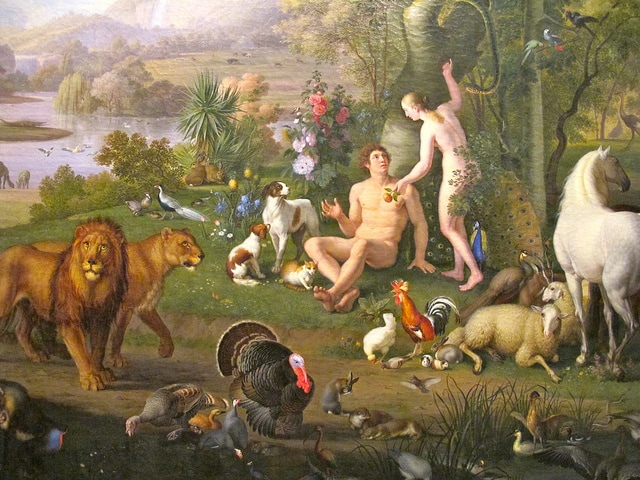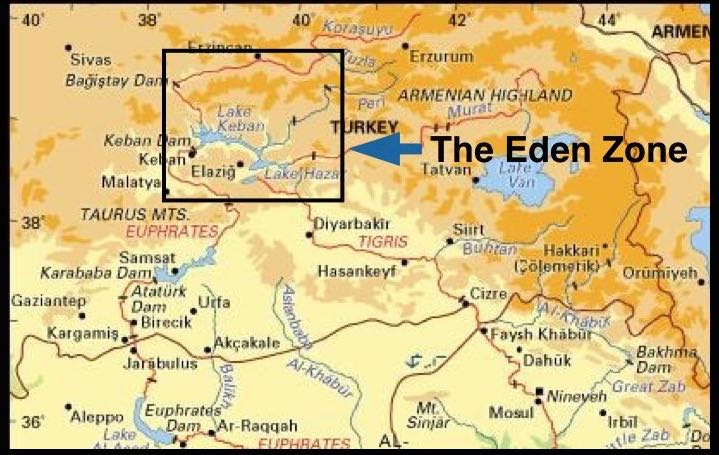|
(Note: This is another episode in my continuing exploration of the Bible. You can read my series introduction here. All Bible quote are NIV and cannot be used for commercial purposes. Read copyright information here.) Genesis 2 Something struck me immediately reading Genesis 2 - the style of writing felt markedly different from Genesis 1. Genesis 1 really feels like it bleeds into Genesis 2:1-3, with a wrap of creation and God resting on the seventh day, and the story ready to move on. Then, in Genesis 2:4, the intro appears to start all over with this line: 4 This is the account of the heavens and the earth when they were created, when the Lord God made the earth and the heavens. (NIV) Now, we go back and look in greater detail at the creation of man. However, instead of the simple, poetic-like and rhythmic writing of Genesis 1, we find a more narrative style. However, this subtle change in prose wasn’t the big eye-opener for me. That came in Genesis 2:5 5 Now no shrub had yet appeared on the earth and no plant had yet sprung up, for the Lord God had not sent rain on the earth and there was no one to work the ground, 6 but streams came up from the earth and watered the whole surface of the ground. 7 Then the Lord God formed a man from the dust of the ground and breathed into his nostrils the breath of life, and the man became a living being. (NIV) NOT WHAT I LEARNED IN SUNDAY SCHOOL: I assumed, based on what I was taught my whole life, that this was the account of the first person on earth, and it is, but not in the way I was taught. Genesis 2:5-7 is very clear when the creation of Adam occurs when “no plant had yet sprung up.” According to Genesis 1:11, God made the plants on Day 3 of creation. That places these events of Genesis 2 clearly three whole “God Days” before the stated creation of mankind on “God Day 6”. Just taking this as I read it, the events in the Garden begin on Day 3, and the rest of mankind is created on Day 6. Here’s a few more observations on that note: Genesis 2:7, God creates “the man” (singular) from dust of the ground and breath of his nostrils (spirit of God?). In Genesis 1:26-27, God creates “mankind” in his image through the spoken word, as he created all things in Genesis 1. In Genesis 1, he also makes men and women at the same time (on Day 6), and gives them the command to reproduce. In Genesis 2, God starts with a single man using not his words, but dust and breath (physical acts). Call me crazy, but the way it reads to me is the creation of Adam (and later Eve) are unique events that occur three “God Days” before the creation of mankind as a whole. I know this flies in the face of thousands of years of Biblical interpretation, and if you read the introduction to this series, you know I am not a Biblical scholar. So, I am probably wrong. That being said, if the Bible is truly the inspired Word of God, then it should be accessible and understandable by the common man or woman. I am the common man, and to me it appears Adam was created on Day 3, and differently, then the rest of humanity on Day 6. Is Adam set apart for a special purpose? Let’s keep reading… 8 Now the Lord God had planted a garden in the east, in Eden; and there he put the man he had formed. 9 The Lord God made all kinds of trees grow out of the ground—trees that were pleasing to the eye and good for food. In the middle of the garden were the tree of life and the tree of the knowledge of good and evil. (NIV) Here, God makes a special place for the man he created and places him there. I find the concepts of the two trees utterly fascinating, one of life and one of knowledge of good and evil. I’m going to come back to that later. 10 A river watering the garden flowed from Eden; from there it was separated into four headwaters. 11 The name of the first is the Pishon; it winds through the entire land of Havilah, where there is gold. 12 (The gold of that land is good; aromatic resin and onyx are also there.) 13 The name of the second river is the Gihon; it winds through the entire land of Cush. 14 The name of the third river is the Tigris; it runs along the east side of Ashur. And the fourth river is the Euphrates. (NIV) So, based on this, where is Eden? People have made a living, or destroyed their lives, trying to answer that question. What did I do? While in my pajamas, I employed the powers of Google Earth and this is what I came up with. Eden has four rivers flowing from it, two of which are known, Euphrates and Tigris, both of which originate in Turkey (ancient Tubal). That one was easy. It also mentions the Pishon, that winds through the land of Havilah, where there is gold. Well, a quick search of the gold-bearing regions of Turkey pretty much puts Havilah just north of the Lake Keban. Several rivers, including the Aras, flow east away from the region into Armenia and Iran. Other rivers flow west to the Black Sea. There are several ancient places in Iran along the Turkish border with “Kish” or “Kush” in their names. So, with all that said, I would venture a guess ancient Eden would be somewhere in the vicinity of Turkey’s Lake Keban area. Plenty of other people have had this theory long before I did, so I can claim no original credit. Even if it was my idea, keep in mind I am just a guy in his pajamas with an internet blog who is an expert on absolutely nothing. 15 The Lord God took the man and put him in the Garden of Eden to work it and take care of it. 16 And the Lord God commanded the man, “You are free to eat from any tree in the garden; 17 but you must not eat from the tree of the knowledge of good and evil, for when you eat from it you will certainly die.” (NIV)
Mankind’s first occupation – gardener. Here, too, we see God issue more orders. He says to the man that he must not eat from the tree of knowledge of good and evil, because by doing so the man will die. This leads to a question, is the man immortal? Will by eating it cause him to die instantly, or will it nullify some kind of immortality? And why did God put the trees there in the first place? Could he have placed these trees somewhere else to eliminate any chance of the man taking a nibble? It seems to me if the man is unaware of the difference between good and evil, how can he know that the act of disobeying God is wrong in the first place? Did you also notice God didn’t prohibit Adam from eating from the tree of life? 18 The Lord God said, “It is not good for the man to be alone. I will make a helper suitable for him.” 19 Now the Lord God had formed out of the ground all the wild animals and all the birds in the sky. He brought them to the man to see what he would name them; and whatever the man called each living creature, that was its name. 20 So the man gave names to all the livestock, the birds in the sky and all the wild animals. (NIV) This is different than Genesis 1, where God merely spoke on Day 5 and Day 6 and the creatures were formed. Here, he forms them physically, as he did the man, from the dust. We also see the man’s second job as “Namer of Things.” If the man was created on Day 3 and then over the course of the next three “God Days” the animals are brought before the man in succession. The sun and moon and stars aren’t even created until Day 4. Does that mean the man was around to witness the first sunrise? Fascinating. But for Adam no suitable helper was found. 21 So the Lord God caused the man to fall into a deep sleep; and while he was sleeping, he took one of the man’s ribs and then closed up the place with flesh. 22 Then the Lord God made a woman from the rib he had taken out of the man, and he brought her to the man. (NIV) This is the first time “the man” is referred to as “Adam.” My son has had two ribs removed during his many surgeries, and both grew back. Until that time, I didn’t know ribs grew back. GEEK ALERT: If God made the woman from one of Adam’s ribs, then her DNA and his DNA are the same, minus a missing chromosome. The woman would be Adam’s twin, or better yet, his clone. MIND BLOWN. 23 The man said, “This is now bone of my bones and flesh of my flesh; she shall be called ‘woman,’ for she was taken out of man.” 24 That is why a man leaves his father and mother and is united to his wife, and they become one flesh. 25 Adam and his wife were both naked, and they felt no shame. (NIV) This is very beautiful, and I’m pretty sure these words were recited during my wedding. Still, I can’t shake how different it feels from Genesis 1, as if two accounts were stitched together. It also has that mythological feel to it, because it has “…and that why things are the way they are” vibe similar to many other culture’s myths. Here’s another weird thing… “and they become one flesh.” From Persia to Egypt, from Arabia to Turkey, ancient men were often polygamous (and the richer the man, the more the wives). SPOILER ALERT; Many of the men mentioned in the Bible later on had multiple wives. That’s lots of “one-fleshing” going on. This account seems monogamous inspirit, and contrary to those deep-seated polygamous traditions. Genesis 2 also seems contrary to the natural order of women being the life-giving sex, the gestating birth-giver. Speaking of flesh…its odd that the scripture makes a point of Adam and his wife (she hasn’t been called Eve yet) being naked and unashamed. I think it paints them as childlike and reflecting back to the prohibition against eating from the Tree of Knowledge of Good and Evil, perhaps innocence is the theme of Genesis 2. With innocence in mind, next time we’ll explore Genesis 3, The Fall. I hope you’re enjoying the series! *** Brian Braden is the author the book THE ILLUSION EXOTIC, the historical fantasy novel BLACK SEA GODS and several other exciting books. Comments are closed.
|
Archives
July 2023
Categories
All
|


 RSS Feed
RSS Feed